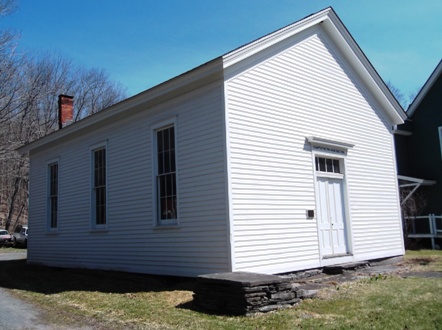By Trish Adams
First published in the Catskill Mountain News
If your ancestors include Boutons, Faulkners, Scudders, Hewitts, Hinkleys, Hubbells, Blishes, Kellys, Dimmicks, Millers, Davises, or Greens, it’s likely that you are part of the founding stock of one of the hardiest, hard-core sects of Baptists in this country, dating back to the days before the Civil War.
Ben Bath, an ethno-musicologist, gave us an insider’s view of the founding of the Old School “Primitive” Baptists, as well as the music that got them (and us) on our feet, in a fascinating presentation at the Middletown Historical Society this past Sunday (June 8). Elder Hubbell could not make it, but perhaps he was toe-tapping from above.
What’s an ethno-musicologist? It’s someone who loves to study the intersection of a group or culture and its music, to see how the music reveals their values, beliefs and experiences. A musicologist believes that what people sang or played helps us understand how they lived.

The 1886 Halcottsville OSB Church
How our faith practice began
The Protestant faith now has numberless denominations, but the roots of Protestantism in the 1500s is truly “Protest” — back then it was against Rome and the Pope, against heirarchies and church corruption, against any barrier between the worshipper and God. All across Europe, but especially in England, wars were fought, blood was shed and clandestine sects were formed as people sought a way to worship outside the Catholic and state-established churches.
Many of the Scots-Irish settlers in our area were such “pilgrims,” seeking a place to worship their own way: strict, yes, but also egalitarian, without arcane structures, or paid ministers — a faith that did not “solicit” or “convert” but wanted only true believers. Like many early Protestant faiths, our original Baptists frowned on “music,” which to them meant instruments. Singing psalms from the Bible, or other “hymns” in unison together, was still part of worship.
Have you ever been to a service — or a concert — where a leader wanted you to sing with them, so they shout out the words first, and then you sing them? This is a long standing church tradition called “Lines Out” or “Lining.” This began in earlier days because some church members could not read. So the song leaders or ministers would call out the words, so everyone could sing to the tune chosen for that hymn.
In Old School Baptist and some other older Protestant sects, this tradition still stands firm. It also remains part of the ritual of folk and other indigineous music concerts. Some early Protestant faiths believed only actual words from the Bible (the Psalms) should be sung; hymns were the religious words, regardless of tunes, and “tune books” were ones that included notes to sing.
The Scots-Irish — who were a large part of the founders in our area — were also a seminal force in the Revolutionary War: some 5,000 of them signed up in this country for the sole purpose of defeating the British in the cause of religious freedom. They fought to ensure that America would be one place free of state religions forever.
Our area was one of two major “homes” to the “Primitive” Baptist movement (along with key areas in the South), in large part because of Gilbert Beebe, its most inspirational preacher, who founded churches in this area in the 1830s. Beebe was to Primitive Baptists what John Wesley was to Methodists. When his own sect became too liberal for him, Beebe split the Baptists again fifty years later in 1884, forming the “Absoluters” or “Hard Shell” Baptists. Along with certain places in North Carolina, Old School Baptists have no firmer or longer foundation that they do, right here, in the heart of our valleys.
There are not many OSB churches left: mostly here, Maine and spots in the South; that tells us that isolation from larger cultural forces helps maintain this “primitive” Baptist tradition. Also that cultures that are naturally “stoic,” and fatalistic might be a more likely home to such a breed of Baptist. Especially a century or so ago, if you sang a hymn, saying you might not see your neighbor next week, you truly knew that could come to pass. A random horse kick, pneumonia, a fire… just look at the front page of this paper any given week from 1902 onwards. Old School Baptists knew whereof of they sang.

The restored Vega OSB Church, now a performance hall owned by the Roxbury Arts Group
The Old School doctrine found a perfect home here; all of God’s beauty, surrounded by all of God’s hardship. It took a true believer and, it helped that everything God had designed for you was pre-destined: you could be saved, but you understood that everyone was tainted with sin, and you might be damned. Whatever befell you, was part of God’s plan.
And so your ancestors harnessed the buggy, or went on foot, every Sunday, to these cold, spare, elegant houses of worship once a week, stood in unison and sang together, man and wife, men and women together. In many religious establishments around the world, that was still a radical idea. But these were men and women who toiled together and stood before “God” every day in their fields, farms and homes. They lived their religion, and the songs they sang every Sunday bore testament to all they knew of this world, and the next.
